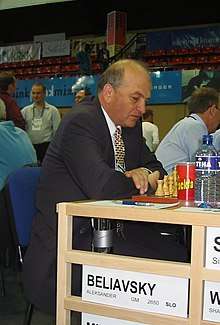Alexander Beliavsky
Alexander Genrikhovich Beliavsky (Russian: Алекса́ндр Ге́нрихович Беля́вский, Ukrainian: Олександр Генріхович Бєлявський; also romanized Belyavsky; born December 17, 1953) is a Ukrainian and Slovenian chess player. He was awarded the title of Grandmaster by FIDE in 1975.
| Alexander Beliavsky | |
|---|---|
 Beliavsky at the 35th Chess Olympiad, Bled 2002 | |
| Full name | Alexander Genrikhovich Beliavsky |
| Country | Soviet Union → Ukraine Slovenia (since 1994)[1] |
| Born | December 17, 1953 Lviv, Ukrainian SSR, Soviet Union |
| Title | Grandmaster (1975) |
| FIDE rating | 2517 (August 2020) |
| Peak rating | 2710 (July 1997) |
Beliavsky was born in Lviv, USSR, now Ukraine. Since 1994, he lives in Slovenia and he plays for its national team.[1]
Career
Beliavsky won the World Junior Chess Championship in 1973 and the USSR Chess Championship four times (in 1974, 1980, 1987 and 1990).
In the 1982–84 World Chess Championship cycle, he qualified for the Candidates Tournament, losing to eventual winner Garry Kasparov in the quarterfinals of the 1983 Candidates matches. Beliavsky played on the top board for the USSR team that won the gold medal in the 1984 Chess Olympiad.[2]
In tournaments, he was first equal at Baden 1980, first at Tilburg 1981, second equal at Tilburg 1984, joint winner at Wijk aan Zee 1984 and joint second at the same event a year later. At the second Russia (USSR) vs Rest of the World match in 1984, he was the top scorer for the victorious Soviet team, defeating Yasser Seirawan 2–0 and Bent Larsen 1½–½. Beliavsky won the Vidmar Memorial tournament four times: in 1999, 2001, 2003 (with Emil Sutovsky) and 2005.[3] In 2013 he tied for 1st–8th places with Alexander Moiseenko, Evgeny Romanov, Hrant Melkumyan, Constantin Lupulescu, Francisco Vallejo Pons, Sergei Movsesian, Ian Nepomniachtchi, Alexey Dreev and Evgeny Alekseev in the European Individual Chess Championship, thus qualifying for the FIDE World Cup.[4]
He is also a chess coach and in 2004 was awarded the title of FIDE Senior Trainer.
In November 2009, he was the oldest person among the world's top 100 active players,[5] but as of October 2011 he is no longer in the top 100.[6] He competed at the 2009 Maccabiah Games.[7]
Beliavsky shares the record for having defeated the most undisputed world champions. He has defeated nine - every undisputed world champion since Vassily Smyslov except Bobby Fischer - a record he shares with Paul Keres and Victor Korchnoi.
Books
- Beliavsky, Alexander; Mikhalchishin, Adrian (1995), Winning Endgame Technique, Batsford, ISBN 0-7134-7512-9
- Beliavsky, Alexander; Mikhalchishin, Adrian (1998). Fianchetto Grunfeld. Everyman Chess. ISBN 978-1-85744-204-5.
- Beliavsky, Alexander (1998), Uncompromising Chess, Cadogan, ISBN 1-85744-205-9
- Beliavsky, Alexander; Mikhalchishin, Adrian (1999), The Two Knights Defence, Batsford, ISBN 0-7134-8441-1
- Beliavsky, Alexander; Mikhalchishin, Adrian (2000), Winning Endgame Strategy, Batsford, ISBN 0-7134-8446-2
- Beliavsky, Alexander; Mikhalchishin, Adrian (2003), Modern Endgame Practice, Batsford, ISBN 0-7134-8740-2
References
- "Украинец выиграл чемпионат Европы по шахматам". Glavred (in Ukrainian). 17 May 2013. Retrieved 4 December 2016.
- Vasiliev, Yuri (8 June 2015). "АЛЕКСАНДР БЕЛЯВСКИЙ: ИГРАЮЩИЙ ДИНОЗАВР". ChessPro (in Russian). Retrieved 4 December 2016.
- "Dr. Milan Vidmar Memorial Tournaments". sah-zveza.si. Archived from the original on 8 February 2012. Retrieved 6 April 2010.
- Crowther, Mark (2013-05-16). "14th European Individual Championships 2013". The Week in Chess. Retrieved 18 May 2013.
- "Top 100 Players November 2009 FIDE Top players archive". FIDE. Retrieved 4 December 2016.
- "FIDE Top players and Statistics". FIDE. Retrieved 4 December 2016.
- Soffer, Ram (2013-07-24). "2013 Maccabiah Games - The Jewish Olympics". Chess News. ChessBase. Retrieved 2019-11-14.
External links
- Alexander G Beliavsky games at 365Chess.com
- Alexander Beliavsky player profile and games at Chessgames.com
- Alexander Beliavsky team chess record at Olimobase.org